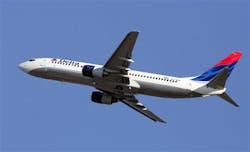The results, announced before the market opened Thursday, missed Wall Street expectations. Delta Air Lines shares rose 8 cents, or 2.2 percent, to $3.78 in early trading on the New York Stock Exchange.
The Atlanta-based company said that for the three months ending March 31 it lost $1.08 billion, or $7.64 a share, compared to a loss of $387 million, or $3.12 a share, for the same period a year ago. The current loss includes $5 million in dividends paid out to preferred shareholders.
Excluding one-time items, Delta said it lost $684 million, or $4.89 a share. On that basis, analysts surveyed by Thomson Financial were expecting a loss of $4.76 a share.
Revenue in the January-March period rose 3.3 percent to $3.65 billion, compared to $3.53 billion recorded a year ago.
''Today's financial results clearly are disappointing,'' said Gerald Grinstein, Delta's chief executive officer. ''Record-breaking fuel prices are masking the many crucial, large-scale, core initiatives our airline implemented during the quarter.''
He added, ''The issue is simple: including fuel, Delta is not on plan, but excluding fuel, we are better than plan.''
The loss reported Thursday is on top of another $8.5 billion Delta has lost since 2001.
In the first quarter, Delta recorded a $453 million charge primarily due to the cost of pension benefits related to the planned reduction of 6,000 to 7,000 jobs announced in September and the partial freeze of benefit accruals under the pilot defined benefit plan. It also recorded other charges related to the pilot pension plan and an aircraft settlement. Delta recorded a $144 million benefit from a reduction in its deferred income tax asset reserve.
Going forward, Delta indicated that its situation could get even worse because of projected further increases in fuel prices.
It said that every 1 cent increase in the average annual cost per gallon of jet fuel costs Delta roughly $25 million in additional fuel expense per year. Delta's business plan assumes an average fuel price per gallon in 2005 of $1.22. However, it said Thursday that projections call for crude oil prices to be substantially higher for 2005 than Delta's business plan, and the airline has no hedges or contractual arrangements in place that would reduce its jet fuel costs below market prices.
Delta ended the quarter with $1.8 billion in unrestricted cash.
The airline said its capital expenditures for the June 2005 quarter are estimated to be roughly $350 million, including $210 million for aircraft. Capital expenditures for all of 2005 are estimated to be roughly $1 billion, including $570 million for aircraft.
Delta said all of its regional jet aircraft deliveries in 2005 will be financed under existing agreements. The remaining mainline aircraft to be delivered in 2005 are scheduled to be sold to a third party immediately upon delivery from the manufacturer, which Delta had previously announced.
Delta, which is transforming its business to reduce costs and attract more fliers, has blamed high fuel prices and low fares as major factors contributing to its mounting losses.
Delta nearly fell into bankruptcy late last year before winning deep concessions from pilots and fresh financing from creditors.





